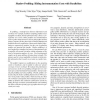Free Online Productivity Tools
i2Speak
i2Symbol
i2OCR
iTex2Img
iWeb2Print
iWeb2Shot
i2Type
iPdf2Split
iPdf2Merge
i2Bopomofo
i2Arabic
i2Style
i2Image
i2PDF
iLatex2Rtf
Sci2ools
141
click to vote
CGO
2007
IEEE
2007
IEEE
Shadow Profiling: Hiding Instrumentation Costs with Parallelism
In profiling, a tradeoff exists between information and overhead. For example, hardware-sampling profilers incur negligible overhead, but the information they collect is consequently very coarse. Other profilers use instrumentation tools to gather temporal traces such as path profiles and hot memory streams, but they have high overhead. Runtime and feedback-directed compilation systems need detailed information to aggressively optimize, but the cost of gathering profiles can outweigh the benefits. Shadow profiling is a novel method for sampling long traces of instrumented code in parallel with normal execution, taking advantage of the trend of increasing numbers of cores. Each instrumented sample can be many millions of instructions in length. The primary goal is to incur negligible overhead, yet attain profile information that is nearly as accurate as a perfect profile. The profiler requires no modifications to the operating system or hardware, and is tunable to allow for greater cov...
CGO 2007 | Negligible Overhead | Shadow Profiling | Shadow Profiling Framework | Software Engineering |
| Added | 13 Aug 2010 |
| Updated | 13 Aug 2010 |
| Type | Conference |
| Year | 2007 |
| Where | CGO |
| Authors | Tipp Moseley, Alex Shye, Vijay Janapa Reddi, Dirk Grunwald, Ramesh Peri |
Comments (0)

